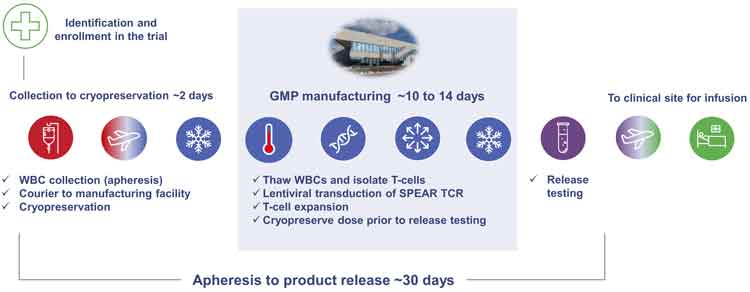Building an integrated vector supply to support autologous cell therapy for solid tumours
Posted: 9 November 2022 | James Nanista, Josh Hunt | No comments yet
Facing limited viral vector manufacturing capacity, should companies consider further integrating their viral vector supply to address this issue? James Nanista and Josh Hunt of Adaptimmune reflect on the options.


Autologous cell therapies are becoming an increasingly established treatment option – particularly for patients with late-stage cancer. To deliver these therapies at an ever-increasing rate requires a robust supply chain, of which viral vectors are a critical component for many cell and gene therapy companies.
Traditionally, companies have sought to outsource the development and manufacture of vectors to a contract development and manufacturing organisation (CDMO). However, increasing demand from a growing market, logistics issues and manufacturing challenges all contribute to a less stable supply chain. Within recent years this situation has been further exacerbated by the COVID-19 pandemic: both directly, through viral vaccine manufacture; and indirectly, through instability in global supply chains.
An integrated vector supply, however, can help manage uncontrollable external factors by limiting supply chain uncertainty and allowing companies to respond in a more agile manner to challenges as they arise. To integrate vector supply, upfront challenges and costs include developing a scalable process and setting up a good manufacturing practice (GMP) manufacturing facility. However, these challenges are far outweighed by the long-term benefits of better meeting patient needs.
“An ever-expanding pipeline of products with 14 therapies (gene therapies, gene‑modified cell therapies and recombinant vector vaccines) currently marketed in the EU, Japan, US and UK, utilise viral vectors”
Using a viral vector for transgene delivery is commonplace across the cell and gene therapy industry. An ever-expanding pipeline of products with 14 therapies (gene therapies, gene‑modified cell therapies and recombinant vector vaccines) currently marketed in the EU, Japan, US and UK, utilise viral vectors – with an additional 3,000 therapies pending approval.1 This rising demand in turn places even greater pressure on a vector supply chain that currently does not have the capacity to support this.
An analysis performed at the end of 2019 concluded that demand for viral vectors would have surpassed CDMO capacity during 2020.2 However, this assessment has recently been altered with the emergence of the COVID-19 pandemic and its subsequent negative impact on manufacturing capacity. Capacity has been impacted by COVID-19 vaccine developers who are in direct competition with vaccines both in the commercial and development phases. Those available commercially include adenoviral-based vaccines by AstraZeneca and Johnson & Johnson. Concomitantly, general supply chain issues, such as plastics, single‑use tubing and bags that are used as standard, have also had an impact across the industry.
Given the extraneous demand, it could be asked why capacity has not kept pace as one would expect with other modalities. Two key differences limit industry’s capability:
- A lack of standardised processes across the industry, incurring greater development costs and increased challenge to obtain regulatory approval
- The fact that vector processes are also more difficult to scale up, requiring high-grade facilities and highly specialised personnel.
Alternatively, to mitigate some of the risks associated with outsourcing vector manufacturing to a CDMO, a company can manufacture vectors in-house, as taking this approach has numerous advantages. One of the most important for a fast-paced cell and gene therapy company is having greater control over a critical part of the supply chain by eliminating delays associated with securing manufacturing slots at a CDMO. This grants the business more agility in responding to changing needs and greater resilience to external shocks, such as the recent pandemic. Another factor in this enhanced adaptability is development of in-house expertise that enables more efficient interaction by simplifying communication channels. This also applies to conversations with regulators, a complex three-channel discussion involving the CDMO is not only inefficient but can also mean some nuances in feedback are not received by the sponsor. An integrated vector supply also supports regulatory submission through the greater product understanding gained by having better integration between the viral vector and the T-cell product in late-stage development activities. Once the product is approved, having an integrated vector supply means the business can better compete on cost. However, the greatest benefit is reduction of risk to patient supply, thus ensuring safe and timely delivery of treatment to patients.
Adaptimmune has successfully integrated its vector manufacturing. It is currently developing and manufacturing autologous cell therapies for clinical trials at numerous sites in North America and Europe, for a variety of solid tumour types, with the aim of commercial manufacture in 2023. Essentially, a patient’s white blood cells are collected in a clinical setting and sent to a centralised manufacturing facility where the T cells are isolated and transduced with lentiviral vectors to express the gene for an engineered T-cell receptor (SPEAR TCR). The cells are then expanded over a period of days, cryopreserved, and returned to the hospital where the cells are thawed and the patient lymphodepleted prior to infusion of the engineered T cells (see Figure 1).


Figure 1: The patient cell journey for AdaptImmune’s autologous SPEAR T-cell therapy products.
Building in-house vector supply
The first stage in bringing vector supply in-house was the development of a vector manufacturing process. Adopting the principles of quality by design (QbD) by carrying out pragmatic and smart experiments is critical to developing a successful and robust process. This approach simplifies later stages for both development and regulatory filings. It also helps with building a strong knowledge base of the process parameters and their potential impacts, which ultimately helps establish critical process parameter limits and prepares for characterisation. During development it is also beneficial to consider practical aspects of GMP manufacturing and develop a straightforward process, which can reduce the likelihood of deviations while maximising yields.
The first key step was developing a serum-free suspension-based process using stirred tank reactors. This process overcame the typical scale-up issues encountered in adherent systems at a manufacturing scale and dramatically increased yields. Combined with developing an effective purification process, a successful platform process allows Adaptimmune to manufacture lentiviral vectors in-house.
Following initial development, the lentiviral vector process was transferred into the GMP manufacturing facility. As a pre-revenue cell therapy company, Adaptimmune was able to utilise a module within the Cell and Gene Therapy Catapult site in Stevenage, UK, which provides GMP modular cleanrooms for developing large-scale manufacturing systems.
“Some key considerations for a GMP manufacturing suite include space utilisation, expected process workflow, operator headcount, materials quality and specifications, and documentation suitability for batch records and process descriptions with outlined unit operations.”
Some key considerations for a GMP manufacturing suite include space utilisation, expected process workflow, operator headcount, materials quality and specifications, and documentation suitability for batch records and process descriptions with outlined unit operations. These are just a few of the required considerations that must be signed off by regulatory bodies once all criteria have been met in establishing a GMP facility.
Technology transfer of the process from development to manufacturing involves generating a wide variety of documentation, data and training. Once this information has been generated and successfully handed over to the relevant teams, alongside any required training, a series of engineering runs can take place with the support of the Development and Quality Assurance teams. Upon their successful completion, the process can be considered transferred. Technology transfer is an inherently complex and time-consuming process but is sufficiently smoother when conducted internally as opposed to by a CDMO.
The entirety of development, technology transfer and early manufacturing batches has resulted in a high performing, cross‑functional group that works towards a common goal by utilising a wide variety of skills and expertise. This has been the cornerstone for developing a successful supply of in-house lentiviral vector.
References
- Outlook for Viral Vector Contract Manufacturing – Gene Therapies, Cell Therapies, and COVID-19 Vaccines [Internet]. Globaldata.com. 2021 [Cited 16 September 2022]. Available from: https://www.globaldata.com/store/report/viral-vector-contract-manufacturing-industry-analysis/
- 2. Rininger J, Fennell A, Schoukroun-Barnes L, et al. Capacity Analysis for Viral Vector Manufacturing – BioProcess International [Internet]. 2022 [Cited 16 September 2022]. Available from: https://bioprocessintl.com/manufacturing/emerging-therapeutics-manufacturing/capacity-analysis-for-viral-vector-manufacturing-is-there-enough/




Issue
Related topics
Biopharmaceuticals, Bioprocessing, Bioproduction, Gene therapy, Manufacturing, Supply Chain, t-cells, Vaccines









